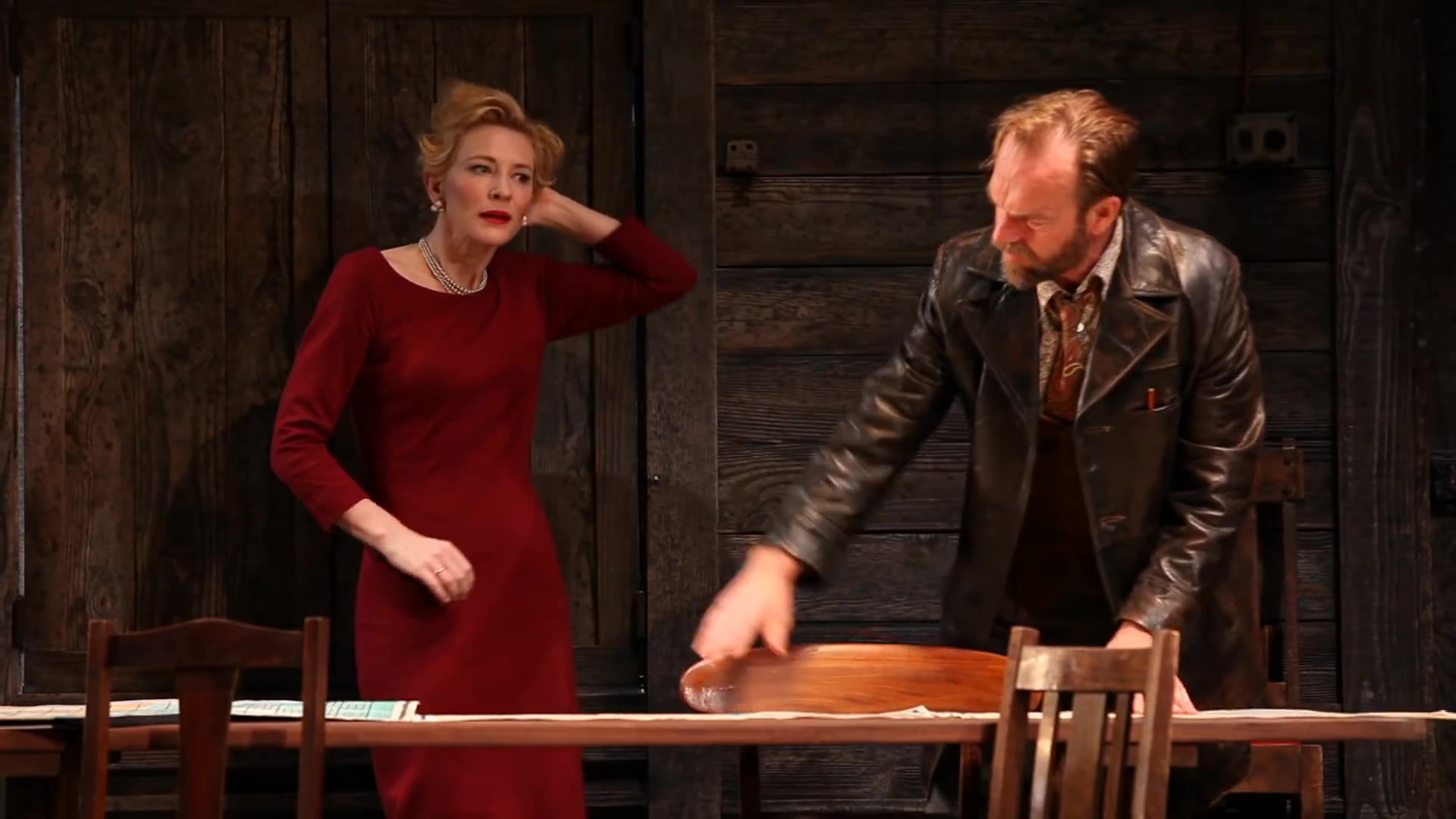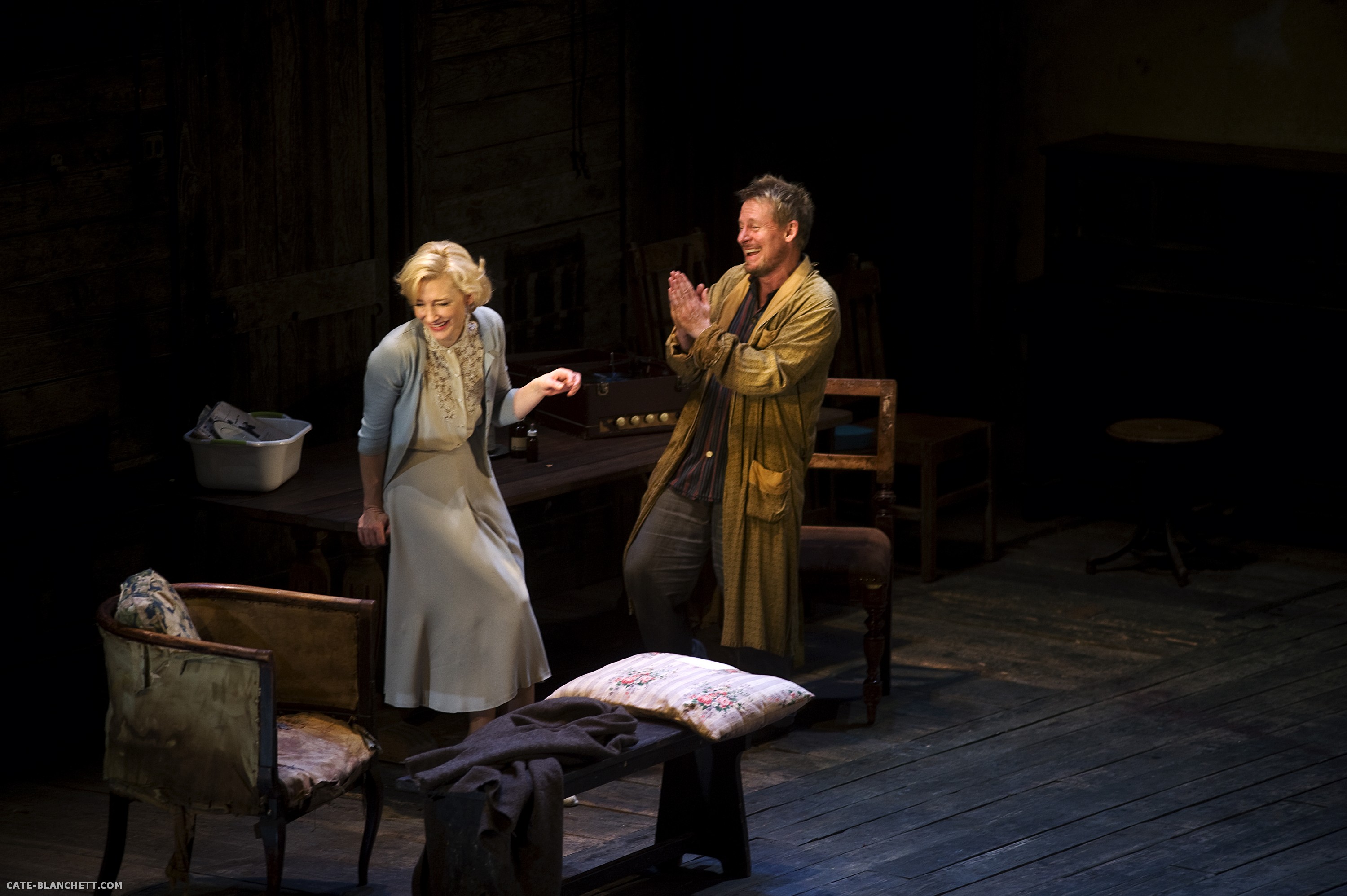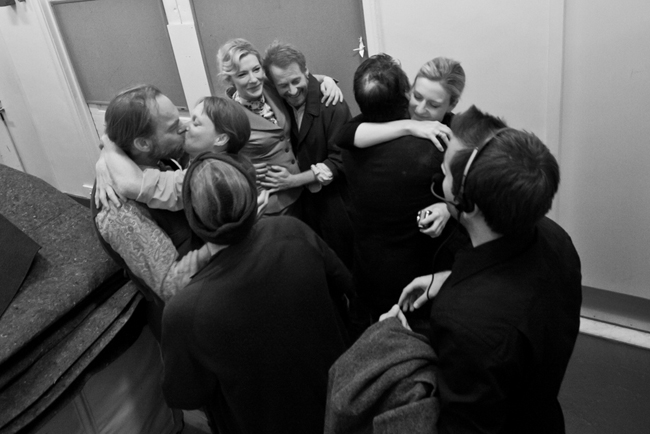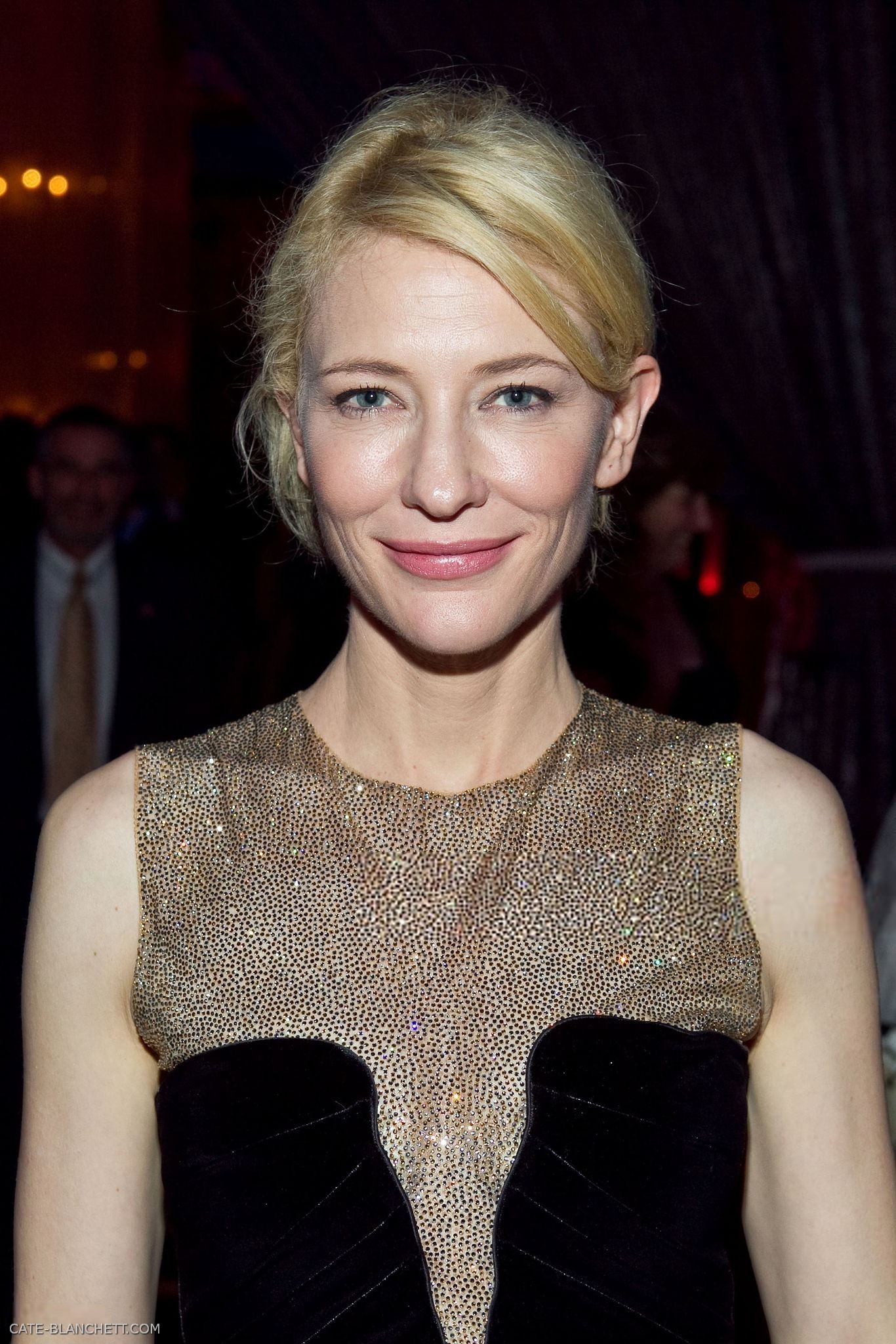
Cate Blanchett as: Yelena
Directed by: Tamás Ascher
Adapted by: New adaptation by Andrew Upton (Play by Anton Chekhov)
Play run: 9 November 2010 – 1 January 2011 (opened on 13 November 2010)
Venue: Roslyn Packer Theatre at Sydney Theatre Company
* The play toured Washington D.C. in 2011 and New York in 2012.
Photos | Videos
On a dilapidated, remote farm Uncle Vanya and his niece Sonya have worked slavishly to sustain an estate in decline. And so it has been for years
Now Professor Serebryakov and his beautiful young wife, Yelena, have returned to visit. Adding to the chaos and disruption are the constant visits of the charismatic Astrov. Lunch is no longer served at lunch time – now it is procrastinated until dusk – work is forgotten and the long, cool nights have become sleepless.
From this hotbed of disarray grow three consuming love affairs, each of which is destined to wither in disappointment before it has reached bloom. It is in this climate of frustration and hopelessness that the Professor chooses to unveil his shocking plan to sell the estate. Faced with an uncertain future, Vanya is provoked into an act of violence which is as humiliatingly unsuccessful as his attempts at romance.
Gliding effortlessly between comedy and tragedy, this treasure classic from Anton Chekhov lays bare the fruitlessness of human endeavour with exceptional warmth, humours, and insight.
Cast:
Cate Blanchett as Yelena (Professor Serebryakov, aged twenty?seven)
Richard Roxburgh as Uncle Vanya (Ivan Petrovich Voinitsky [ Vanya], Mariya’s son & Sonya’s uncle)
John Bell as Professor Serebryakov (Aleksandr Vladimirovich Serebryakov, a retired professor)
Hugo Weaving as Astrov (Mikhail Lvovich Astrov)
Hayley McElhinney as Sonya (Sofya Aleksandrovna)
Sandy Gore as Maria (Mariya Vasilievna Voinitskaia, mother of the professor’s first wife)
Anthony Phelan as Telegin (Ilya Ilich Telegin, an impoverished landowner)
Andrew Tighe as Farmhand
Jacki Weaver as Marina (A nanny)
Creatives:
Set design by Zsolt Khell
Costume design by Gyorgyi Szakacs
Lighting design by Nick Schlieper
Sound design by Paul Charlier
Related Images
View more images at the gallery.


- “Chekhov is tricky. As we say in Australia, he’s a bugger to perform. The process of rehearsing it, it was a bit like doing a clowning workshop, not that we were trying to get up there and be funny, but in the way that you have got to get up there and risk being and doing nothing.” (PBS, August 2011)
- “The wonderful thing about Hugo and Richard – and this often doesn’t happen in Uncle Vanya – is that Richard is an actor who has played Hamlet. He is a hero, a leading man, and often Vanya is cast as a misanthrophic, no-hope kind of figure. To have two heroes, men who could have walked the same path but made slightly different choices and somehow ended up in the same place, is fascinating. Initially when speaking to them about Vanya, we discovered that the yahd been talking years ago about playing it and swapping roles each night because, really, even though I think Richard is perfect casting as Vanya, there is a sense that he could also play Astrov. That is something that Tamás really worked with in the way he built the relationship between the two men.” (Gotham, 2012)
Quotes from Others
- Andrew Upton:
— “It’s definitely been – for us personally as artistic directors – one of our favorite projects. I think [this production of Uncle Vanya] has all the things that separate good theatre from a great theatre experience. There was just this serendipity around the way that piece of programming happened. It found its own voice, it found its own time, it found its own cast, it founds its own director, and now it is finding this lovely extended life [New York run at City Center].”
— “What Tamás is able to find in Chekhov is the Chaplinesque quality, the melancholy of the clown. There are indeed moments that you would call slapstick. Astrov, who’s played by Hugo Weaving, falls out of a window. Cate’s character falls through a door that opens behind her. But they’re not gratuitous moments. They occur at points when everything is getting a little mad and silly because of the growing passions between people that are unexpressed.” - Tamás Ascher:
— “There’s no theatrical style or form that Cate [Blanchett] wouldn’t gladly try, as her imagination is ignited by previously untried possibilities. This is the main source of her artistic strength.”
Selected Reviews
Excerpts from selected reviews.
- Sydney Morning Herald (Sydney)— “Andrew Upton’s translation (crafted from a translation by Alex Menglet) is clipped, colloquial and rough-edged. With Ascher pushing his cast to work against default images of stasis and familiar poses, it makes for a clear, supple and lively exploration of terminal decline.
Across the board the performances are exceptional, lead by Hugo Weaving as the burned-out doctor and eco-crusader Astrov. Virile but with voice and manners coarsened by drink, Weaving allows us a clear look at the man Astrov can be as well as the ruin he will likely become. By contrast, Roxburgh’s hunched and rumpled Vanya is already a goner, almost a man without shape. It’s a lovely performance, unflashy and affecting.
Bell’s Serebryakov – gouty, vain, reptilian – is absolutely on the money and Blanchett’s Yelena is not so much a mermaid (as Vanya describes her at one point) but more a fish-out-of-water, dressed in figure-hugging frocks and crowned in platinum curls. Her playing of Yelena’s contradictory mass of feelings is finely graded and funny, typified by the moment when she silently points an imaginary pistol at the back of Serebryakov’s head. Her farewell scene with Astrov is a rom-com mini-masterclass.” - New York Times (Washington D.C.) — “What blissfully irritating people they are. Cranks, I believe, is the word that keeps coming up to describe them. Under most circumstances I’d run a country mile to avoid being trapped in a room with the desperate characters now inhabiting the Sydney Theater Company’s production of Chekhov’s “Uncle Vanya” at the Kennedy Center here. Yet I consider the three hours I spent on Saturday night watching them complain about how bored they are among the happiest of my theatergoing life.
Staged by the Hungarian director Tamas Ascher — and featuring a brilliant daredevil performance by Cate Blanchett as a chipped trophy wife — this “Uncle Vanya” gets under your skin like no other I have seen. For what is created here is an ever-pulsing portrait of just how impossible and essential it is to live in close quarters with those maddening creatures called human beings, especially those you regard (Heaven help you) as family.
…With her movie star credentials and fashion-magazine looks, Ms. Blanchett (a dazzling Blanche in the Sydney Theater Company’s touring “Streetcar Named Desire” two years ago) is the obvious popular draw here. And she confirms her status as one of the best and bravest actresses on the planet, with a go-for-broke yet artfully contained performance that keeps sabotaging her own natural elegance.
But the entire cast — which also includes Jacki Weaver (unrecognizable from her Oscar-nominated turn in “Animal Kingdom”) as the old family nanny, Sandy Gore as Vanya’s petulant mother and Anthony Phelan as a hapless hanger-on — is close to Ms. Blanchett’s level (and in the case of Mr. Weaving, right there on it). They all give thoroughly detailed physical performances, in which you always feel both the chafe and dubious comfort of domestic intimacy.” - Washington City Paper (Washington D.C.) — “Yelena isn’t as flashy a role as Blanche DuBois, but Blanchett’s performance is every inch as visceral. (In his first English-language production, Hungarian director Tamás Ascher has found more opportunities for physical comedy than one expects from Chekhov, and he exploits them beautifully.) A scene in which Yelena tries to suppress her lust while Astrov lectures her about the evils of deforestation—like Al Gore, he’s brought charts—plays like high-toned slapstick, with Blanchett seemingly attempting to wriggle out of her own skin. When Blanchett and Weaving finally do share a brief kiss, their bodies push apart from one another, magnets of like polarity.
Which makes a kind of sense: Blanchett and Weaving have the sharpest features in the cast by a mile. Though we know them from the movies, their almost unnervingly angular faces make them ideal for stage work—you could probably make them out from the cheapest seat in the house.
Their prodigious vocal powers are on full display, too. When Upton decided to have Astrov attempt Yelena’s seduction by calling her a “delicious predator, you beautiful, sleek ferret!” he must’ve known he was aiming those words at his wife, right? (Blanchett and Upton are spouses and co-artistic directors of Sydney Theatre.) Selling the illusion of decay can’t be easy on a stage trafficked by such glamorous beings, but scenic and sound designers Zsolt Khell and Paul Charlier, respectively, pull it off.” - TheaterMania (Washington D.C.) — “Dressed in a series of simply stunning 1950ish ensembles (by costumer Gyorgyi Szackas), Blanchett’s Yelena is no mere mannequin. She’s clearly a highly intelligent woman — you believe her when she says she married the much-older Serebryakov (a perfectly pompous John Bell) because she was impressed with his love of learning — but her lack of real purpose has left her more interested in herself than anything else, and barely at that. Indeed, while Blanchett’s Yelena exhibits true hints of feelings for both Astrov and Vanya, finding love or even real companionship hardly seems a priority; distraction of any sort is the name of her game.
Conversely, Roxburgh’s passion for Yelena is deeply palpable. The actor, who delivers a splendidly nuanced performance, is more conventionally attractive than some others who have played the role and less the buffoon; and so, it’s even more heartbreaking that he didn’t fully pursue Yelena years before because of his belief that he must devote himself to his late sister’s estate.
Weaving captures Astrov’s charisma and ability for greatness, but there’s something remarkably disconcerting about his own semi-jaded world view; he clearly cares more about the trees he could save than anyone in his orbit, be it his patients, Sonia, or even Yelena. In the other supporting roles, Oscar winner Jacki Weaver (completely unrecognizable) makes the strongest impression as the worldly-wise housekeeper Marina.” - Observer (New York) — “…as she’s [Cate Blanchett] costumed and lit in the splendid Sydney Theatre Company staging of Uncle Vanya now at City Center as part of the Lincoln Center Festival, and as the production is designed, she’s more than beautiful in the catalyzing role of Yelena: she’s otherworldly.
…Yelena makes her entrance like a 1950s Italian movie star—a vision in off-white, pressed and spotless from headscarf to heels, clutching a purse and hidden behind sunglasses. She is in the same luxe off-white when she reappears in bedclothes later in that act, and she’s in bright red—gown, shoes, lips—for Act II. Even in the gloomy Act IV, when she has changed into gray, it’s a sharply tailored suit, with her platinum hair piled on her head: the Eva Peron of Petersburg, and equally seductive. (The play is set sometime in the middle of the 20th century, a time with radio but not television, when the men wore ties and jackets but not waistcoats.) When others are dimly lit, a spotlight always lingers subtly on Ms. Blanchett. Yelena is the destabilizing force at this estate.”
Trivia & Facts
- The play toured at Kennedy Center in Washington D.C. (4-24 August 2011) then at City Center in New York City (19-28 July) as part of Lincoln Center Festival.
- Cate Blanchett and Hugo Weaving have worked together in TV series, film, and theatre: Bordertown (1995); The Lord of the Rings trilogy (2001-2003), Little Fish (2005), The Hobbit Trilogy (2012-2014); Hedda Gabler (2004-06), Uncle Vanya (2010-12).
- Cate Blanchett and Richard Roxburgh have worked together in film and theatre — Thank God He Met Lizzie (1997), Oscar and Lucinda (1997) and The Turning (Segment: Reunion, 2013); Hamlet (1994-95), The Seagull (1997), Uncle Vanya (2010-12), and The Present (2015-17).
- Cate Blanchett guest starred in the TV series, Rake (2014), as the lesbian version of Richard Roxburgh’s character.
- Cate Blanchett was nominated for Best Supporting Actress in a Play at 2010 Sydney Theatre Awards, she won Best Female Actor in a Play at 2011 Helpmann Awards and Outstanding Lead Actress, Non-Resident Production at 2012 Helen Hayes Awards.



 Welcome to Cate Blanchett Fan, your prime resource for all things Cate Blanchett. Here you'll find all the latest news, pictures and information. You may know the Academy Award Winner from movies such as Elizabeth, Blue Jasmine, Carol, The Aviator, Lord of The Rings, Thor: Ragnarok, among many others. We hope you enjoy your stay and have fun!
Welcome to Cate Blanchett Fan, your prime resource for all things Cate Blanchett. Here you'll find all the latest news, pictures and information. You may know the Academy Award Winner from movies such as Elizabeth, Blue Jasmine, Carol, The Aviator, Lord of The Rings, Thor: Ragnarok, among many others. We hope you enjoy your stay and have fun! 
 A Manual for Cleaning Women (202?)
A Manual for Cleaning Women (202?) The Seagull (2025)
The Seagull (2025) Bozo Over Roses (2025)
Bozo Over Roses (2025) Black Bag (2025)
Black Bag (2025)  Father Mother Brother Sister (2025)
Father Mother Brother Sister (2025)  Disclaimer (2024)
Disclaimer (2024)  Rumours (2024)
Rumours (2024)  Borderlands (2024)
Borderlands (2024)  The New Boy (2023)
The New Boy (2023) 











